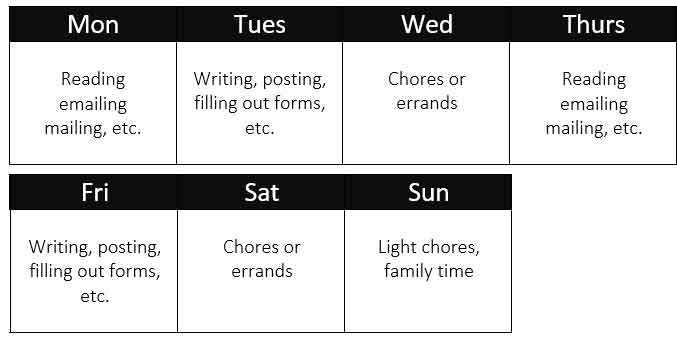
Reading and Central Sensitization
Because of my impaired ability to concentrate and hold attention due to pain and fatigue, reading is a planned activity, rather than something I decide would be a great thing to do at the moment. Because I’m a scholar and write a lot, I also need to read a lot, be it physical books and science journals, or their digital copies.
Reading Days & Hours
Scheduled reading days and hours are marked by slow days and peak energy hours, rather than days also including errands or chores or random times of the day. This is because I typically only have energy for one or the other (chores, errands, OR reading) and my peak energy hours are when I do errands, chores, OR reading. If I read and write on the same day, 50% of my peak hours are spent on reading, and 50% on writing.
On days I only read, 100% of that time goes to reading. Of course it depends on what I’m reading. Academic stuff is harder to read, it takes a lot more focus, so an hour or an hour and 1/2 is about the most I may be able to do. At that point I MIGHT be able to continue with light reading, or my brain fog may take over completely. However, if I only do light reading that day, I may be able to read for a more extended period of time.
When the brain fog hits full force, I can read a sentence and not recall what I just read, no matter how many times I read it (in one ear and out the other, in a sense). It hurts mentally and even physically to focus at this point, and even if it’s something I personally wrote earlier in the day, I may not be able to make heads or tails of it (it might as well be written in Japanese).
Words do not make sense, words that are understood and do go in are out of sequence, and I may not be able to connect one sentence to another (comprehend a point or story line). It’s like reading aphasia. As though my cognitive capabilities become slowly and progressively impaired over a very short period of time. The same goes for writing, listening to other people talk, and even talking. This issue is most prominent in the early morning, is lowest around 12pm, and is high again by the evening.
Depending on how much physical or mental exertion I experience during the day, I may be so confused by the evening that I cannot watch new TV episodes or movies, because I cannot understand what is being said. I recognize the words, but I cannot integrate the information coherently.
When this aphasia-like, short-term memory loss period sets in, I don’t push myself, I know it’s useless.
I simply close the book, save the Word file, or switch to a TV series or movie (I have Netflix) I have seen so many times before it’s impossible for me to be confused because I am relying entirely on my long term memory.
How to Know What to Read & When
I have a 5-minute rule for everything I do. Whether it’s exercising, chores, reading, writing, etc. The rule is as simple as it sounds; try to do it for 5 minutes, if after 5 minutes I just cannot do it, I move on to something else. If I can do it, then I continue until I no longer can. Once the aphasia-like symptoms kick in, I stop immediately and insert a bookmark.
If I start reading difficult things and I cannot focus, I don’t give up on reading altogether. Nope, I switch to lighter reading and see if I can handle that. If I cannot handle that, I keep trying other activities until I find something useful to do with myself. Because I always make sure I’m doing something (to keep my mind of f the pain), I am very productive. I never force myself to do things when I know now is not the time. This is because (a) I know I can’t, and (b) if I even try I’ll mess it up and may end up spending the whole next day cleaning up my mess.
For instance, washing dishes when I’m to out of it results in breaking dishes. Or writing when I’m to out of it leads to so many grammatical errors, wrong words, spelling issues, etc. that it would take longer to write and fix it than to just wait and do it right the first time. Not wasting my time on things I know I cannot do saves me a lot of time and energy in the long run. As does scheduling days to do certain activities. I may not be able to read anything for 3 days, and then read a whole lot on the 4th day. In the end I usually catch up. It’s all a matter of patience and pacing.
Of course my health doesn’t always cooperate and allow me to stick to my schedule, so I have to remain flexible. And that’s OK.

Minimize Pain & Distractions
You can read more about my controlled environment here. Having a zone for reading that minimizes pain and distractions is key to getting more reading time.
Avoid Certain Medications, Supplements, & Food
Medications that you take at night to make you more sleepy, or have the side effect of drowsiness, may contribute to more drowsiness during the day. Ask your doctor if you can reduce this medication for a week to see if it helps you more with focus. Also, some medications you take first thing in the morning can also contribute to brain fog, as well as supplements. Food can also contribute to brain fog. Because of this, I do not ingest pain medications, supplements, or food until later in the day.
The only thing I have first thing in the morning is a glass of water with lemon juice and half a caffeine pill. I get basic easy tasks out of the away until the caffeine kicks in around 11am. 11am-12pm I get the tough stuff done and around 12-1pm I have a very small lunch (an apple, a hard boiled egg), and focus-wise, it’s usually down hill from there. By 2pm-3pm I eat a hardy meal and I pretty much have my day wrapped up and my next day planned out. Planning what you are going to do the next day requires a lot less effort than actually doing stuff. So avoid waiting until peak energy hours to plan, do it while your coming down from a peak instead.
DON’T WAIST YOUR PEAK HOURS ON THE EASY STUFF!

